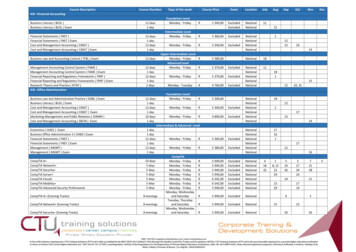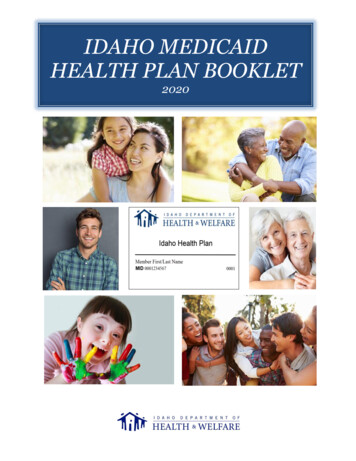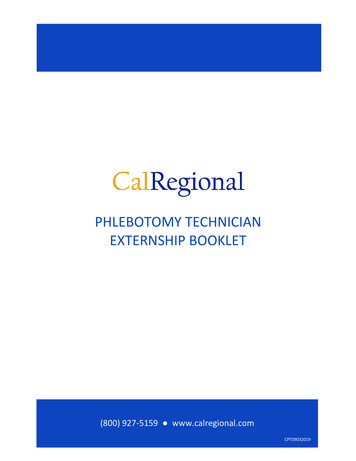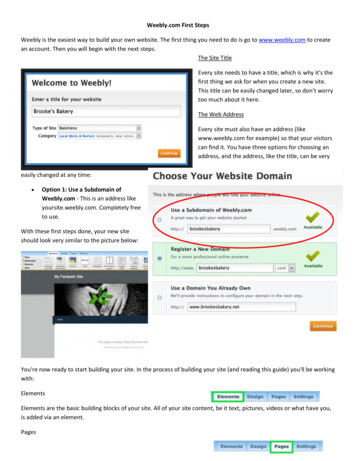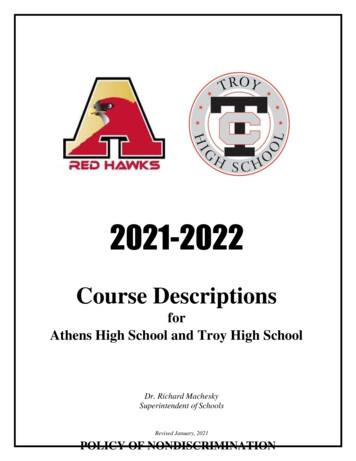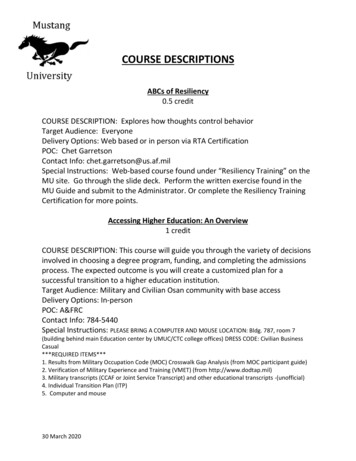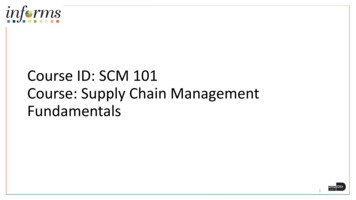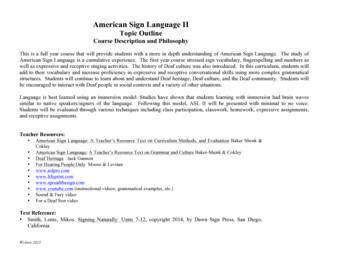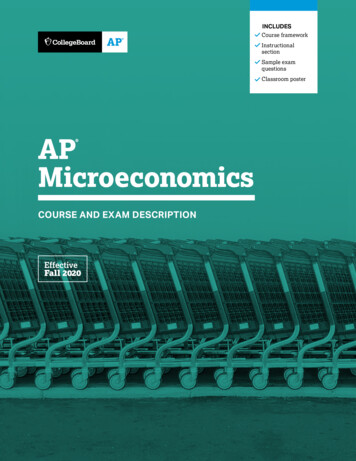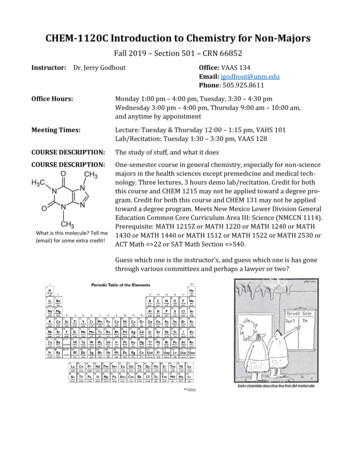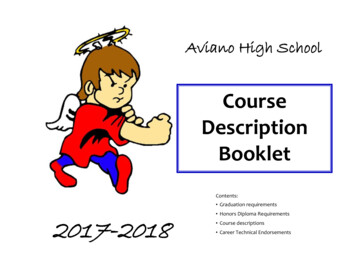
Transcription
Aviano High SchoolCourseDescriptionBookletContents: Graduation requirements Honors Diploma Requirements2017-2018 Course descriptions Career Technical EndorsementsPage 1
Dear Students and Parents,Following are the graduation requirements, the list of possible course offerings at Aviano High School, and theprofessional technical studies certificate information for the 2017-2018school year. Please pay particularlyclose attention to the graduation requirements.All students in DODEA schools are required to have a 6-year plan. This plan identifies graduation requirements and the specific courses you have taken and intend to take in order to fulfill those requirements. Everyyear the counselors assist students in updating their plans during course selection sessions in the English classes. Students then have the opportunity to share these with their parents. Parents, if you have not seen thisplan nor discussed it with your student, feel free to contact your student’s counselor to set up an appointment.Students, if you are not sure if you have one, please see your counselor.Aviano High School offers courses to meet all levels of challenge. If you are a student who consistently scoresabove the 90th percentile in standardized testing, consider the Honors and AP offerings. If you are a studentwho finds math and language arts courses challenging and who scores below the 50th percentile in standardized testing, pay attention to the support courses offered in math and reading.We hope you find this catalog helpful and informative. If you have any questions, please do not hesitate tocontact us.Counseling DepartmentPage 2
Aviano High SchoolTable of ContentsGraduation Requirements4Courses by Curricular Area5Course Descriptions listed alphabeticallyCareer/Technical EndorsementsPage 36-2122-25
Aviano High SchoolGraduation RequirementsCurricular AreaLanguage Arts (English)Credits Required4Social Studies3Mathematics4students graduating 2017 or later need 4Science3Foreign Language2Fine Arts1Physical EducationPersonal Fitness, Activity and Nutrition andLifetime Sports1.5Health0.5Career Technical Ed2Electives5TOTAL26** Must have a cumulative GPA of 2.0 in order to graduate.***Honors Diploma is available with a minimum of 4 AP courses and a cumulative 3.8 GPA. In the course descriptions, a “G” following the curricular area designation indicates that the course willsatisfy graduation credit requirements for that curricular area.Page 4
Courses by Curricular AreaLanguage ArtsLanguage Arts 9, 10, 11, 12; Honors English 9, 10; AP English Language and Composition; AP English Literature andCompositionSocial StudiesWorld History 9,10; Honors World History 9; United States History; AP US History; US Government; AP US GovernmentPolitics-DL; Economics; AP Psychology; Sociology-DL; Psychology DLMathematicsAlgebra I; Algebraic Modeling; Algebra II; Geometry; Discrete Mathematics; Mathematical Analysis/Pre-Calculus; AP StatisticsDL; AP Calculus ABScienceBiology; Environmental Science; Chemistry; Physics Applications in the Community; Physics;AP Physics; Marine Biology - DL; AP Chemistry DL Foreign LanguageItalian I, II, III, IV AP; Spanish I, II, III, IV; AP German-DL; AP French-DLFine ArtsFundamentals of Art; Studio Art; Drama Theater; Humanities; Music Appreciation; Beginning Band; Intermediate Band;Advanced Band, GuitarPhysical EducationPE/Personal Fitness, PE /Activity and Nutrition; PE/Lifetime SportsHealthHealth EdCareer Technical ED:**BUSINESS: Accounting I, II; Word Processing Software Applications (Microsoft Word); Business & Personal Finances; Mgmt International Business; Business Law; Presentation Software Applications (PowerPoint); Spreadsheet Software Applications (Excel);TECHNOLOGY: Architectural Drawing; Applied Architectural Design/CAD; Engineering Drawing/CAD; Robotics Engineering; ComputerAnimation; Research Project Tech ; Gaming Technology I & II-DLCOMPUTERS: AP Computer Science A & AB-DL; Digital Imaging; Digital Media; Digital Publishing; Web Design; Java ProgrammingI, II-DL; Visual Basic Programming I, II-DLAIR FORCE JROTC I, II, III, IVCAREER PRACTICUM I, II, lllElectivesAVID 9, 10, 11, 12; AVID Tutor; Yearbook Production; Speech; Reading Lab 9, 10, 11, 12; Algebra I Lab I; Math Lab (Alg II); GeometryLab; Learning Strategies; Journalism**All PTS certificate programs are listed following course descriptions in the back of this booklet***ALL DL (Distance Learning) courses must have prior approvalPage 5
Aviano High SchoolCourseDescriptionsPage 6
Course TitleAccounting ICurricular AreaCareer/PTS - GCreditGrade110-12Major Concepts/Content: Accounting I introduces students to accepted accounting principles and the complete basic accounting cycle, which includes financial statements for service and merchandising businesses. Additional topics covered are payroll, notes, depreciation, forms of ownership,and the importance of ethics.Accounting IICareer/PTS - G111-12Major Concepts/Content: Accounting II expands the accounting concepts learned in Accounting I. Students will be introduced to partnership and corporate accounting concepts, accounting procedures for manufacturing businesses, cost and managerial concepts, and analysis tools. Notes and depreciation will be studied in greater depth.Advanced BandFine Arts - G19-12Major Concepts/Content: The advanced band course is designed to acquaint students with advanced instrumental music skills. The content includes,but is not limited to, the following: the interpretation and analysis of musical scores; the application of musical nuances in playing from a score; independent performance of all major and minor scales; advanced rhythm patterns; performance as a soloist and in small and large group ensembles; avariety of music repertoire, including style, periods, forms, electronic music; intermediate to advanced level sight-reading exercises; and introductionto computer/synthesizer musical composition.Air Force JROTC I, II, III, IVCareer/PTS - G19-12Major Concepts/Content: The Air Force JROTC I course is designed to acquaint secondary school students with the historical development of flightand the role of the military in history. Over half of the available classroom hours are spent reviewing the development of flight from ancient legends tothe space shuttle. Additionally, the role of the military throughout the history of the United States is identified. The second half of the course examines the make-up of the aerospace community and the United States Air Force. Many of the sixty hours directed to leadership studies relate directlyto other school academic subjects, with cadets presenting both written and oral reports.Algebra IMath - G19-12Major Concepts/Content: This course may be the most common entry level course for students who have had a rich and varied middle level mathematics program. It expands upon basic algebraic concepts previously acquired and integrates those principles with everyday life. The processes ofproblem solving, reasoning, communication and making connections are emphasized. Students will use formulas, functions, and equations to describe and clarify relationships, and will use geometry to represent algebraic relationships. Students will learn how to write and translate expressionsinto mathematical forms, solve first and second degree equations, and use the concept of a function to model real-world phenomena.Algebra I Lab IELECTIVE19-12Major Concepts/Content: This class is designed to provide a developmental approach to the building of algebraic concepts, to expand upon basicalgebraic concepts previously acquired, to integrate those principles with everyday life, and to assist all students in viewing algebra as a language ofmodeling the real world through problem solving. Learning will be through concrete activities and modeling, whenever possible, with less emphasisupon computational or symbol manipulating facility Students will use formulas, functions, and equations to Describe and clarify relation-ships, andwill utilize geometry to represent algebraic relationships.Page 7
Course TitleAlgebraic ModelingCurricular AreaMath - GCreditGrade110-12Major Concepts/Content: Algebraic Modeling will help students understand the connection between math and their daily lives. Students will exploreAlgebra 1 topics such as linear, quadratic, exponential and piecewise functions by modeling real world situations. Students will identify key characteristics, represent problems algebraically and graphically, determine lines/curves of best fit and make predictions. Concepts and solutions are presented in non-threatening, easy-to-understand language with numerous examples to illustrate ideas. Whether the student will go on to study early childhood education, graphic arts, automotive technologies, criminal justice or something else, the student will discover that the practical applications ofmathematical modeling will continue to be useful well after they have finished this course.Algebra IIMath - G110-12Major Concepts/Content: This course engages students in advanced algebraic concepts through the study of functions of functions, polynomials,complex matrices, and sequences and series. Students will make connections by integrating algebra into geometry, data analysis, and into othercurricular areas. Student reasoning will involve linear equations and inequalities, systems of linear equations, matrices and determinants, quadraticequations and relations, functions and graphs, powers, roots, and radicals, exponential and logarithmic functions, polynomials and polynomial functions, rational expressions and functions, sequences and series, probability and statistics, and circular trigonometric functions.AP BiologyLaboratory Science - G111-12Major Concepts/Content: AP Biology (year-long) is an introductory college-level biology course. Students cultivate their understanding of biologythrough inquiry-based investigations as they explore the following topics: evolution, cellular processes ⠔ energy and communication, genetics, information transfer, ecology, and interactions. The Advanced Placement Program enables willing and academically prepared students to pursuecollege-level studies ⠔ with the opportunity to earn college credit, advanced placement, or both ⠔ while still in high school. AP Exams are giveneach year in May. This course requires that 25 percent of the instructional time will be spent in hands-on laboratory work.AP Calculus BC-DL*(See your Counselor) Math - GAP Comp Sci A/AB-DL*1Computer/PTS - G12111-12Major Concepts/Content: The course description for the advanced placement courses published by College Boards is to be used for the abovecourse. The Advanced Placement Program offers two computer science courses: Computer Science A and Computer Science AB. The content ofComputer Science A is a subset of the content of Computer Science AB. Computer Science A emphasizes programming methodology with a concentration on problem solving and algorithm development and is meant to be the equivalent of a first-semester course in Computer Science. It alsoincludes the study of data structures and abstraction, but these topics are not covered to the extent that they are covered in Computer Science AB.Computer Science AB includes all the topics of Computer Science A, as well as a more formal and in-depth study of algorithms, data structures, andabstraction. For example, binary trees are studied in Computer Science AB but not in Computer Science A.AP Chemistry-DL*Laboratory Science - G111-12Major Concepts/Content: AP Chemistry is a college-level on line course which differs from a high school Chemistry course in terms of depth of coverage, the type of laboratory work and time commitments for study. The topics in AP Chemistry are detailed in the AP Chemistry course description,which is available on AP Central (http://apcentral.collegeboard.com).Page 8
Course TitleAP English Language*Curricular AreaCreditLanguage Arts - G1Grade11-12An AP course in English Language and Composition engages students in becoming skilled readers of prose written in a variety of periods, disciplines,and rhetorical contexts and in becoming skilled writers who com-pose for a variety of purposes. Both their writing and their reading should make students aware of the interactions among a writer's purposes, audience expectations, and subjects as well as the way generic conventions and the resources of language contribute to effectiveness in writing.AP English Literature*Language Arts - G111-12An AP English course in Literature and Composition should engage students in the careful reading and critical analysis of imaginative literature.Through the close reading of selected texts, students should deepen their understanding of the ways writers use language to provide both meaning andpleasure for their readers. As they read, students should consider a work's structure, style, and themes as well as such smaller-scale elements as theuse of figurative language, imagery, symbolism, and tone.AP French-DL*Foreign Language-G111-12Major Content/Concepts: AP French Language is equivalent to fifth and sixth semester college work (3rd year college) such as found in university levelFrench Composition and Conversation courses. The 5 domains of learning (Communication, Cultures, Connections, Comparisons, and Communities)involve the skills of listening, speaking, reading, writing, and developing cultural awareness appropriate to this level of coursework. Students will gainstrong proficiency and integrate their language skills. Authentic materials and resources are used along with the required text for AP French Language.AP German-DL*Foreign Language-G111-12AP German Language, emphasizing use of the language for active communication, has as its objective the development of the following competencies:Having a strong command of vocabulary and structure; Understanding spoken German in various conversational situations; Reading newspaper andmagazine articles, contemporary fiction, and non-technical writings without the use of a dictionary; and Fluently and accurately expressing ideas orallyand in writing.AP PsychologySocial Studies—G111-12AP Psychology is designed to introduce students to the systematic and scientific study of the behavior and mental processes of human beings and otheranimals. Students are exposed to the psychological facts, principles, and phenomena associated with each of the major subfields within psychology.They also learn about the methods psychologists use in their science and practice. This course is targeted to students who wish to complete studies insecondary school equivalent to an introductory college course in psychology; the learning experience emphasizes development of an understanding ofpsychology as the science and critical evaluation of "common sense" knowledge about how people function.AP PhysicsLaboratory Science - G111-12The Physics B course provides a systematic introduction to the main principles of physics and emphasizes the development of problem-solving ability. Itis assumed that the student is familiar with algebra and trigonometry; calculus is seldom used, although some theoretical developments may use basicconcepts of calculus. In most colleges, this is a one-year terminal course and is not the usual preparation for more advanced physics and engineeringcourses. However, the B course provides a foundation in physics for students in the life sciences, pre-medicine, and some applied sciences, as well asother fields not directly related to science.Page 9
Course TitleCurricular AreaCurricular AreaAP StatisticsCredit CreditMath - GGrade112Major Concepts/Content: The concepts and content for AP Statistics incorporate the syllabus of the College Board. The topics for AP Statistics aredivided into four major themes: exploratory analysis, planning a study, probability, and statistical inference. Exploratory analysis of data makes use ofgraphical and numerical techniques to study patterns and departures from patterns. Data must be collected according to a well-developed plan if validinformation on a conjecture is to be obtained. Statistical inference guides the selection of appropriate models.App Arch DesignCareer/Computer/PTS - G Prereq19-12Major Concepts/Content: Applied Architectural Design Students will become proficient with AutoDesk Revit. Students will work on two advanced projects where they will develop a design solution for a client. They will design projects to meet LEED (Leadership in Energy and Environmental Design)standards for green building certification.AP US Government-PoliticsSocial Studies - G112Major Concepts/Content: A well-designed AP course in United States Government and Politics will give students an analytical perspective on government and politics in the United States. This course includes both the study of general concepts used to interpret U.S. government and politics and theanalysis of specific examples. It also requires familiarity with the various institutions, groups, beliefs, and ideas that constitute U.S. government andpolitics. While there is no single approach that an AP United States Government and Politics course must follow, students should become acquaintedwith the variety of theoretical perspectives and explanations for various behaviors and outcomes. Certain topics are usually covered in all collegecourses.AP World HistorySocial Studies—G110-12Major Concepts/Content: The purpose of the AP World History course is to develop greater understanding of the evolution of global processes andcontacts in different types of human societies. This understanding is advanced through a combination of selective factual knowledge and appropriateanalytical skills. The course highlights the nature of changes in global frameworks and their causes and con sequences, as well as comparisonsamong major societies. It emphasizes relevant factual knowledge, leading interpretive issues, and skills in analyzing types of historical evidence.Peri odization, explicitly discussed, forms an organizing principle to address change and continuity throughout the course. Specific themes provide further organization to the course, along with consistent attention to contacts among societies that form the core of world history as a field of study.Architectural Draw/CADCareer/Computer/PTS- G19-12Major Concepts/Content: Architectural Drawing/CAD provides students an opportunity to work with design software that professional architects andinterior designers use. Students will learn to use Auto Desk Revit which is a leading edge design tool that was used in designing “Freedom Towers”the new skyscraper to replace the twin towers in New York City. Design projects include designing a design studio, vacation home and a group designproject. Vacation Home Project: Students will find a client and design a vacation home to meet the client’s needs and geographic location. They willneed to develop an energy efficient design that fits the location and design style.Avid TutorELECTIVE111-12Major Concepts/Content: The AVID Tutor program is designed to train students who excel in the academic areas and who have an interest in teachingto work in a collaborative setting with students enrolled in the AVID program. Tutors will undergo a training period in which they will learn to effectivelyuse the three teaching methodologies used in AVID: writing as a tool for learning, the inquiry method, and collaborative grouping.Page 1010
Course TitleCurricular AreaCreditGradeBeginning BandFine Art—G19-12Major Concepts/Content: The beginning band course is designed to introduce students to the following: basic instrumental music techniques such astone production, articulation, breath control, pitch discrimination; melodic and rhythmic concepts and patterns; practice skills and habits; solo, ensemble, and full group rehearsals; a variety of instrumental repertoire; opportunities for private instruction; experiences in performing; and sound practicehabits.BiologyLaboratory Science - G19-12Major Concepts/Content: Biology is designed to provide students with an integrated approach to the study of living organisms, in addition to science asinquiry, science & technology, science & social perspectives, and the history & nature of science. The course integrates unifying science concepts andprocesses of systems, order & organization, evidence, models & explanation, change, consistency & equilibrium; and form & function. Scientific inquiryand understanding about inquiry are emphasized through practical implications and meaningful applications.Business LawCareer/Computer/PTS - G111-12Major Concepts/Content: Business Law provides the student with a survey of the American legal system. This course develops an understanding oflaw as applied to society and to the individual. Topics include the judicial system, contracts, warranties, guarantees, consumer protection, real property, landlord and tenant relationships, sole proprietorship, partnerships, and corporations.Business and Personal FinancesCareer/Computer/PTS - G19-12Major Concepts/Contents: This course is designed to make students aware of the financial challenges confronting them in daily living. Included will besuch topics as how to make intelligent decisions in spending and saving; how to maintain good financial records; how to avoid financial disasters thatresult from the unwise use of credit and credit cards; information about banking services, insurance choices, and investment choices; and how to prepare tax returns.Career PracticumCareer/Computer/PTS - G1-311-12Major Concepts/Content: Career Practicum is designed to provide school-to-career experiences and training through a work practicum related to theircareer goal. Important aspects are to: Provide students an opportunity to acquire an understanding of actual employment settings utilizing their skillsand aptitudes; apply problem solving skills in the work environment; and develop communication techniques.ChemistryLaboratory Science - G110-12Major Concepts/Content: Chemistry is designed to help students understand the major principles of chemistry. Information is acquired through anintegrated approach, incorporating advanced topics with science as inquiry, science & technology, science & social perspectives, and the history &nature of science. The course integrates unifying science concepts and processes of systems, order & organization, evidence, models & explanation,change, consistency & equilibrium; and form & function. Scientific inquiry and understanding about inquiry are emphasized through practical implications and meaningful applications. Topics students' study includes atomic theory and structure, chemical bonding, principles of chemical reactions,molecular structure, and how science and technology relate to chemistry.Page 11
Course TitleComputer AnimationCurricular AreaCreditCareer/Computer/PTS - G1Grade9-12Major Concepts/Content: Computer Animation is a project-based course designed to teach students how to create and edit computer animations. Students will use software to produce animation, audio, and video productions. Students will work with 3D Studio Max that is used primarily for video gamedevelopment. Projects include designing an animated roller coaster and creating a news broadcast introduction.Digital ImagingCareer/Computer/PTS - G19-12Major Concepts/Content: Use imaging software to demonstrate a through understanding of file formats; using the work area and work spaces; importing, exporting and saving; working with sections; creating and using layers; using masks and channels; managing color, adjusting images; drawing andediting; painting; retouching; using actions; working with type; outputting to print; and outputting for the web. Other goals will be to Analyze and evaluatesolutions, maintain files appropriately, demonstrate an understanding of security and risks, demonstrate basic knowledge of operating systems, demonstrate information literacy skills, and Understand the concepts of ethical issues as related to information systems (e.q. privacy, property, and access).Digital MediaCareer/Computer/PTS - G19-12Major Concepts/Content: Digital Media Creation (DMC) provides students with the opportunity to develop professional-level skills in multimedia usingAdobe Flash. This product-oriented course introduces the student to interactive multimedia presentations. Hands-on activities are used as students develop skills, master techniques, and prepare products for a client-based environment. Students learn to create professional digital media creations usinganimation, sound, and videos. The course also introduces students to document construction for publishing on the World Wide W eb using authoringsoftware. Units of instruction include design and layout, font selection, image editing, and digital cameras and images. Internet research and copyrightlaws are emphasized.Digital PublishingCareer/Computer/PTS - G19-12Major Concepts/Content: Publication Software Applications is a course designed for students with an interest in desktop publishing. This course will provide training in the software for personal use and employment. Students completing this course may be eligible to take an Adobe certification exam.Discrete MathematicsMath - G110-12Major Concepts/Content: This discrete mathematics course by design shows a different view of mathematics than as seen in traditional mathematicscourses. It is an applications driven course that is based upon the study of events that occur in small, or discrete, chunks. Discrete concepts are usedextensively in business, industry, government, and the digital world. The major areas of study are counting and probability, graph theory, the mathematics of social choice (voting and fair division), and coding and encryption. Some of the questions investigated in discrete math are: What does a barcode mean? What is the most efficient way a delivery truck can visit ten destinations? Should you buy a lottery ticket?Drama-TheaterFine Arts - G19-12Major Concepts/Content: The drama course is designed to give the students opportunity to experience drama as a significant and rewarding activity andto enable students to demonstrate knowledge of the historical background of drama. The content includes, but is not limited to, recognition of the different genres of drama (tragedy, comedy, farce, melodrama, musical) and the elements of playwriting; knowledge of the different historical periods of drama and acting; understanding of the importance of drama as a reflection of society; recognition of drama as a self-rewarding activity that involves thePage 1212
Course TitleCurricular AreaCreditGradeidentification of the unique worth of the individual, the motivation behind human behavior; and the dynamics of interpersonal relationships.EconomicsSocial Studies Elective - G0.510-12Major Concepts/Content: The economics course is a one-semester course designed to acquaint students with the major concepts in the study ofeconomics. Students study how scarce resources are allocated among competing demands. The production, distribution, and accumulation of wealthare discussed and analyzed. Supply and demand, business organization, money and banking, the role of the federal government, and comparisonsamong economic systems are major topics of study. The course is offered to the secondary student, grades ten through twelve.Engineering AppsMath - G0.510-12Major Concepts/Content: This course is to increase student preparedness in algebra and trigonometry skills as used in engineering. The objective is toincrease student motivation and success in engineering through a hands-on introduction to engineering mathematics. This course does not introducenew concepts in mathematics. This course assumes that students have been previously exposed to all necessary mathematical concepts. These concepts will be mastered through application to engineering problems. Math topics will be reinforced within the context of engineering application.Engineer Draw-CADCareer/Computer/PTS - G19-12Major Concepts/Content: Engineer Drawing/CAD Students will learn to use AutoDesk Inventor, which is used by 80-85% of colleges training designers.This course is strongly recommended for students aspiring to become engineers, architects, designers, CAD technicians and engineer technicians. Students will work on several design projects. With a partner you will design and build a mouse trap car. Students will also participate in the nationwideWest Point Bridge Design Competition.Environmental ScienceScience - G19-12Major Concepts/Content: Environmental Science is designed to be an elective course for students with a career or special interest and high motivationfor an in-depth study of environmental science. Information is presented in an integrated approach with science as inquiry, science & technology, science & social perspectives, and the history & nature of science. The course integrates unifying science concepts and processes of systems, order &organization, evidence, models & explanation, change, consistency & equilibrium, and form & function.Fundamentals of ArtFine Arts - G19-12Major Concepts/Content: The fundamentals of art course is designed as the basic entry course for the art program. The course provides instruction inthe use of the elements of line, Color texture, shape, and space arrangement in works of art. Students learn how to compose a balanced, rhythmic, unified design through a series of assignments that use a variety of two- and three-dimensional art media. Course emphasis is placed on basic techniquesof drawing, painting, printmaking, ceramics, and sculpture that can be used throughout life for communication, expression, and enjoyment.Gaming Technology I & IICareer/Computer/PTS - G19-12Major Concepts/Content: The course Gaming Technology I & II introduces students to the video game design ind
AP Comp Sci A/AB-DL* Computer/PTS - G 1 11-12 Major Concepts/Content: The course description for the advanced placement courses published by College Boards is to be used for the above course. The Advanced Placement Program offers two computer science courses: Computer Science A and Computer Science AB. The content of
